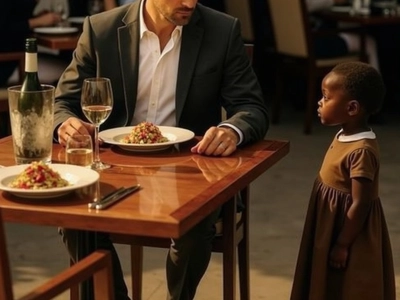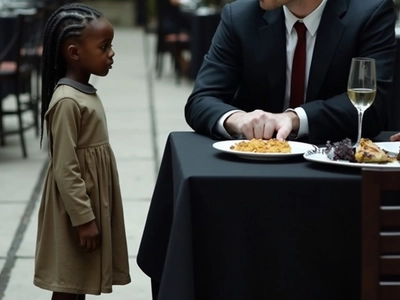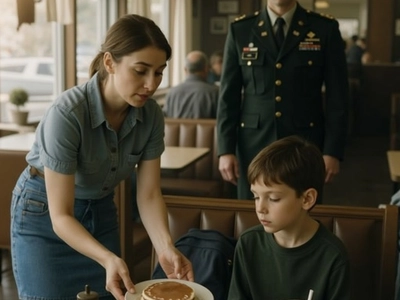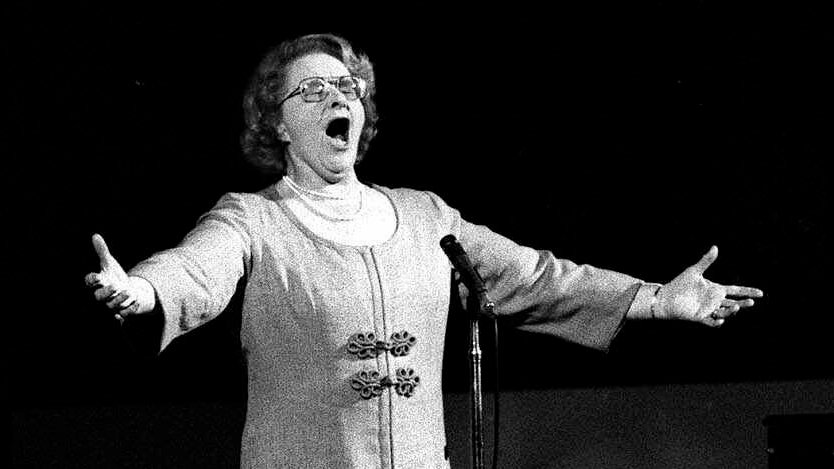“Sir… can I eat with you?”
The voice was small and shaky, but it carried through the busy room like someone had hit pause on a song. Forks stopped in the air. A laugh died halfway. Even the sound of the river outside seemed to go quiet.
The man in the navy suit had just cut into a thick steak. He lifted his head and turned. A girl stood by his table. Her hair was tangled. Her sneakers were dirty and worn thin. Her eyes were big and careful, like she already expected to be told to leave. She looked hungry in a way you could feel.
It was a mild October evening in downtown Chicago. Streetlights threw long golden lines on the sidewalks. People walked past the windows with shopping bags and coats. Inside the restaurant, the air smelled like butter, smoke, and red wine. The place was called Marlowe’s. If you knew food, you knew it. If you didn’t, the prices alone would tell you it was fancy.
The man was Richard Evans. He was a name people in the city said like it meant something. He bought buildings. He fixed them. He sold them. Some people respected him. Some people feared him. Most people didn’t know him. They only knew his suits, his watch, the way he moved like he owned the ground under his feet.
He had planned to eat quickly and go home. No small talk. No dessert. That was the plan. But the girl’s question cracked the plan clean in half.
The maître d’ came toward them with the worried look that staff in nice places wear when something unexpected happens. You could see he was ready to be gentle yet firm. He would tell the girl she couldn’t be here. He would steer her outside and apologize to the man in the suit.
Richard held up a hand without taking his eyes off the girl.
“What’s your name?” he asked. His voice was calm. Not cold. Not warm either. Like a door that wasn’t closed or open yet.
“Emily,” she said. It came out barely louder than a breath. “I haven’t eaten since Friday.”
A few people nearby looked up from their plates. The waiter froze beside the bar. Somewhere, a spoon clinked against a bowl and then didn’t clink again.
Richard nodded once, slow. He pointed to the chair across from him. “Sit.”
Emily sat down like she was ready to jump back up if someone told her to. Her shoulders were tight. Her hands sat in her lap and kept moving, touching each other, pulling at a thread on her sleeve.
Richard signaled to the waiter. “Bring her what I’m having,” he said. “And a warm glass of milk.”
There was a small murmur around them, the kind people think no one hears but everyone does. The waiter hurried off. The maître d’ retreated but stayed within sight.
When the food came, Emily tried to be neat. She tried to hold the knife and fork right. She tried to take small bites. She really did try. But bodies that haven’t eaten in days don’t care about good manners. Her hands shook. The first bite made her eyes close for a second. Then she ate fast, forgetting everything except the taste and the heat and the feeling of food sliding down into a place that had felt empty for too long.
Richard watched her like he was looking at something far away and close at the same time. He didn’t speak. He didn’t rush her. He didn’t tell her to slow down either. He only reached out once to slide the basket of bread closer to her side of the table.
When her plate was almost clean and the milk glass stood empty with a little ring of foam on the rim, he asked the question he’d been holding back.
“Where’s your family?”
Emily kept her eyes on the table. “My dad died,” she said. “Roofing job. He fell. My mom left two years ago. I stayed with my grandma. She… she passed last week.”
Her voice wobbled for a second and then went steady again. She did not cry.
Richard’s face didn’t change. Not enough for anyone in the room to notice, anyway. But his fingers tightened a little on the water glass until his knuckles went white and then back to normal.
No one in that room knew his own story. They saw money and thought that was the whole book. But before the suits, before the watch, before the office high in the sky, there had been nights under stairwells and behind dumpsters. There had been counting coins in his palm enough times to learn how much a nickel weighed without looking. There had been a boy who pushed down hunger and fear so hard he felt nothing for years afterward.
His mother died when he was eight. His father disappeared soon after. He had slept near the same river. He had stared into windows of places like this one, wondering how it would feel to sit where the light was warm and the plates were full. He had promised himself things. Some he reached. Some he lost.
He pulled out his wallet without thinking. He felt the smooth leather. He almost slid a bill across the table. He had done that before. It was easy to fix a moment with a bill. But he stopped. He pushed the wallet back into his pocket. He looked straight at the girl.
“Would you like to come home with me?” he asked.
Emily blinked fast. “What… what do you mean?”
“I live alone,” he said. “I have a spare room. You’ll have food. A bed. School. But you have to work hard and you have to be respectful. I won’t force you. It’s your choice.”
The whispers grew louder. A couple at the next table exchanged a glance. Someone dropped a napkin and didn’t pick it up.
Richard didn’t look at any of them. He kept his eyes on the girl who didn’t trust rooms with soft light and kind voices because both had turned on her before.
“Yes,” Emily said. Her lower lip trembled, but her back straightened. “I’d like that very much.”
The walk to his car felt like a dream to her. Everything was soft. The seats smelled like leather. The city looked different from inside a car with doors that closed smooth and quiet.
His townhouse was in a part of the city she had never walked through. The buildings were neat. The trees along the street were lit from below so their leaves glowed. Inside, the floor was warm under her feet. She stared at the kitchen like it was a movie set: shining steel, clean counters, bowls lined up by size. A giant fridge hummed like a gentle animal.
He showed her the spare room. The bed looked big and too nice to touch. There was a small lamp that made a gold circle on the nightstand. He laid out a folded T-shirt and sweatpants. He pointed to the bathroom. “There are clean towels,” he said. “Take your time. I’ll be in the kitchen.”
She turned the shower knob and jumped back when hot water rushed out. A cloud of steam rose and fogged the mirror. She stood under the water with her face lifted and didn’t move for a long minute. Her skin stung, then warmed. Dirt washed away in rivers. She scrubbed until she saw skin she barely remembered. She used shampoo that smelled like apples. She wrapped a towel around herself and pressed her face into it. It smelled like nothing. That, somehow, felt like grace.
They ate scrambled eggs and toast at the counter. She watched him sprinkle salt the way she’d seen people do on TV. He didn’t ask a lot of questions. He told her the basic rules. “We keep the door locked. We clean up after ourselves. We say where we’re going. We don’t lie. That’s the big one. We don’t lie.”
She nodded. She tried the words on. “We don’t lie.”
He showed her how to use a toothbrush. She stared at the toothpaste foam in the sink like it was magic. That night, she lay on top of the covers for a long time without closing her eyes. The bed felt too soft, like a trap. After an hour, she slid down onto the floor between the bed and the wall. The carpet felt safer—firmer, closer to the ground. She fell asleep curled under the nightstand like a small animal making sure there was a solid thing above her.
In the morning, he found her there and didn’t say anything. He just set a folded blanket next to her and, when she woke, asked if pancakes sounded good.
The first weeks were hard in ways that didn’t show. She was nervous around doors that closed and cupboards that were full. She hid rolls and crackers in the pockets of her hoodie. The housekeeper found them while sweeping under the couch and brought them to the kitchen with raised eyebrows. When Richard asked Emily about it, her face collapsed. She cried hard and messy for the first time.
“I’m sorry,” she said. “I don’t want to be hungry again. I don’t want to get in trouble when there’s no food.”
He knelt until his face was level with hers. He didn’t touch her. He didn’t crowd her. He put his hands on his knees to keep them still. “You will not be hungry again,” he said. “Not in this house. If I ever fail you, you tell me. But I won’t. I promise.”
People say promises like that too easily. They say them to end the crying, to soften the moment, to make themselves feel better. He knew that. He also knew he meant it. Maybe it was the only thing he was completely sure he could keep.
They made a routine because routines are the bones that hold life up when other parts feel shaky. Breakfast, school, homework at the dining table, dinner, dishes, bed. He learned she liked warm milk at night. She learned he liked his coffee black and strong enough to wake the dead. He started keeping a bowl of fresh fruit on the counter because she liked to look at it even when she wasn’t hungry. She liked the colors, she said. She liked knowing it was there.
School was a mountain. There were gaps in her learning big enough to fall into. She struggled with fractions and silent letters. She was good at art and science when she could touch things. She loved diagrams. A social worker helped with the paperwork. The school counselor found extra tutoring. Richard hired a math teacher who came on Wednesdays and didn’t talk down to her. He also sat in on the first few sessions, quiet in the corner, learning how to explain things the way the tutor did. He never said that, but she noticed.
Trust didn’t arrive like a gift. It showed up in bits. It showed up when she got sick and woke up to a glass of water and a cool hand on her forehead. It showed up when he was late one night and called to say, “I’m running behind. I will be home at eight. There’s soup in the fridge.” It showed up when she knocked over a vase and he only asked if her feet were cut by the glass.
Sometimes he woke in the night and sat on the edge of his bed, the city dark and quiet outside his window. Stories rose in him that he hadn’t told anyone in years. The boy he had been came back and stood at the door of his mind, not asking to be let in so much as refusing to leave. He thought of long winters and thin coats. He thought of stealing an apple and being chased. He thought of a man who looked past him like he was air. He let the memories pass through him and out, the way he had learned to do long ago. Then he’d check on Emily. She slept curled small at first, then slowly, as weeks passed, stretched longer across the bed as if her body had decided the ground would not open up under her after all.
He didn’t pry into her memories. He gave her space to bring them up when she wanted. Sometimes a smell or a sound would pull a story out of her. A siren at night. The crackle of a plastic bag. She told him about the food pantry where a volunteer held her wrist too tight and called her “sweetheart” with a smile that wasn’t kind. She told him about her grandmother’s hands, cracked and warm, and how she used to hum without words while she cooked. She told him she used to stand in front of bakeries breathing in because the smell felt like food even when it wasn’t.
He taught her how to cook eggs different ways. She taught him that grilled cheese tastes better if you add a thin slice of tomato and press the sandwich in the pan with a spatula. He showed her how to tie a tie for a school event. She laughed and said she hoped she’d never need that in real life. He showed her anyway.
There were small battles. She swore at a teacher. He took her phone for a week. She sneaked out to meet a friend from the shelter. He set boundaries, not walls. He told her why the world could get dangerous fast if you forgot to respect the lines. She yelled. He didn’t yell back. He waited. She cooled down. The apologies they gave each other were not fancy, but they were real.
He didn’t tell her right away about his past. People think telling the hard story is always brave, but sometimes it’s just heavy. Sometimes it binds you. He needed time to see that giving her his story wouldn’t take away his strength. He needed to feel certain the story wouldn’t make her pity him. He could not stand that.
Years turned like pages. Emily grew. The girl with the torn hoodie became a young woman who still kept an extra granola bar in her bag but now kept it for someone else. She studied late into the night. She asked questions at school that made her teachers smile. She messed up. She tried again. She won a small citywide art prize for a charcoal drawing of a bridge at dusk. She brought the ribbon home and taped it inside her closet, where only she could see.
Richard went to parent-teacher nights. He sat in chairs meant for children and nodded at teachers who talked about effort and attendance and promise. He left work early sometimes for her games and her plays. People in his office learned not to schedule certain meetings after four on Wednesdays, because Wednesday was tutor day and he was always home by then. He didn’t explain. He didn’t have to.
On quiet winter nights, they drank hot cocoa and watched old movies. One of those nights, when the snow made the street silent and the city felt like it was holding its breath, Emily asked, “Who were you before all this?”
She didn’t say it because she was nosy. She said it because she knew she was leaving soon and it felt wrong to take all he had given without knowing the shape of the hands that had given it.
He stared at the TV screen for a moment. He took a slow sip. He set the mug down. “Someone a lot like you,” he said.
She waited. Sometimes the first stone pulled loose the whole wall. Sometimes it didn’t. That night it did. He told her about sleeping in places that were not meant for sleeping, about eating food that was not meant to be eaten, about the day a social worker gave him a coat that was two sizes too big and he wore it until spring, the sleeves rolled up so many times they made thick bands around his wrists. He told her about a woman behind a counter who looked at him with quick pity and then looked away. He told her about how it felt to disappear in a room full of people.
“No one helped me,” he said. “Not when I needed it most. So I learned to help myself. It made me strong. It also made me hard. I told myself I liked it that way. Then one day you asked if you could eat with me. I didn’t know how much I was waiting for that.”
She cried for him in a way she hadn’t cried for herself. It was easier like that. He put a hand on her shoulder and felt the odd rush of being held and holding at the same time.
When she got her acceptance letter to Columbia, she screamed. He laughed—a rough sound he didn’t make often—and then went very quiet and folded the letter back into the envelope like it might tear if he breathed too hard. They celebrated with a dinner he cooked himself. It was not as good as Marlowe’s, but the kitchen smelled like garlic for three days and they were happy.
Leaving was harder than getting in. The last week felt like it was made of goodbyes. Boxes stacked by the door. A checklist on the fridge. A hug with the neighbor who always waved. The housekeeper pressed a small Saint Christopher medal into Emily’s palm and told her it was for safe travels. Emily promised to keep her room tidy and laughed, knowing both of them understood how that would go.
They drove to New York with the trunk full. They talked about nothing and everything. They sang along to songs they both only half knew. At a gas station, she bought a keychain shaped like a tiny slice of pizza and declared it the first piece of her new life.
He helped carry boxes up three flights of stairs. He looked at the dorm bed and tried not to think about the night she had first chosen the floor. He took her for lunch at a place nearby and listened while she planned her classes, her clubs, her future. He said goodbye in the hallway with students moving around them like a river. He said, “Call me if you need anything. Call me if you don’t need anything.” She said, “I will.” They didn’t hug long. They didn’t need to.
The next four years were a string of small notes and big milestones. She called to complain about dining hall food and to cheer about a professor who believed in her. He mailed her a wool hat when the weather turned. She sent him a photo of the first snow in Morningside Heights. He visited once in the spring and took her and three friends to a diner where they all ordered pancakes at noon and talked about books and internships and the kind of change you make with your hands, not slogans.
She worked hard. She stayed kind. When she fell behind, she asked for help. When she got ahead, she pulled someone with her. People notice that sort of thing. By the time she was a senior, she had a way of walking into a room that made people sit up straighter without knowing why.
Graduation came. She wore a cap that kept tilting to the left and fixed it a hundred times. Richard sat in the audience with a program folded over his knee. He had flown in late the night before because a deal closed the same afternoon. He had not slept well. He had not cared.
They called her name. She walked across the stage. He clapped until his hands stung. Then she stepped to the podium at the end, when the valedictorian spoke.
“My story didn’t start here,” she said. “It started on a sidewalk in Chicago. It started with a question I didn’t think anyone would say yes to. It started because a man looked at me and saw a person, not a problem.”
People cried quietly and didn’t wipe their faces because they wanted to hear every word. Richard pressed the program hard against his knee so his hand had something to do.
She came home after graduation not with a plan to take the highest offer on the table but with a plan to build something new. She stood in front of microphones and cameras and faces and said, “I’m starting the ‘Can I Eat With You?’ Foundation. We will feed, house, and teach kids who don’t have any of that right now. The first donation is from my father, Richard Evans. He has pledged thirty percent of his estate.”
She said “father” and looked at him. It hit him like a soft blow in the chest. He didn’t show it on his face. He didn’t have to. She knew.
The story traveled fast. News sites shared it. People texted it to each other with heart emojis and exclamation marks. Money came in from places they had never been. Volunteers signed up. Someone famous posted a video about it and then showed up at a fundraiser with rolled-up sleeves and a check. The point, though, was never the buzz. The point was the kid in the second row whose eyes darted around the room like he was always looking for the exit. The point was the girl who tucked two apples in her pocket without asking and expected to be yelled at and wasn’t.
Richard helped with the paperwork and the connections. He sat at long tables and said yes and no at the right times. He used his name in rooms where it opened doors. Emily kept the mission simple. Feed them. House them. Teach them. Use simple words on the website so anyone could read it and not feel dumb. Make the places clean and bright, not sad and gray. Hire people who remembered what it felt like to sit on the floor beside a bed because the mattress felt unsafe.
They made mistakes and fixed them. They partnered with schools that already knew the kids. They set up a text line because some kids didn’t want to talk on the phone. They gave out prepaid bus cards. They made rules that kept everyone safe and also made space for real life, because real life doesn’t fit rules neatly.
Every year on October fifteenth, they went back to Marlowe’s. Not to eat inside. Not to dress up. They set up tables on the sidewalk. Portable heaters hummed when it was cold. On warm evenings, the river carried laughter down the street. They served hot meals—pasta, roasted chicken, bread still warm from the oven. No sign-up sheets. No questions. If you came hungry, you ate. If you came scared, you left with a belly that didn’t hurt and a paper bag with an extra sandwich and a note tucked inside that said, “See you next time.”
People who had eaten there as kids came back years later to hand out plates. One of them became a nurse. One of them ran a bakery and donated bread every month. One of them taught math and showed up on Wednesdays with a stack of worksheets and made fractions make sense. Kids stayed for seconds and thirds. No one counted. No one made them feel watched. Everyone who served learned how to ask, “Do you want more?” in a way that felt like a gift, not a test.
Sometimes people walked by and shook their heads and said the world was still broken. They weren’t wrong. But the tables were there. The food was there. The hands were there. The world breaks and people put it back together one plate at a time. That, at least, was true.
On one October night, years after the first dinner, a little boy hovered at the edge of the line. He had the same careful eyes Emily once had. She saw him and stepped toward him, keeping her body language loose and easy the way she wished people had done for her long ago.
“Hey,” she said. “Want to eat with us?”
He nodded once. She walked him to a chair. She poured him a warm cup of milk. She set a plate in front of him and said, “This is all for you. Eat until you feel warm.”
Richard watched from a little distance, hands in the pockets of his coat. He felt the old ache in his chest, the one that used to feel like nothing and now felt like everything at once. He had not cried in thirty years before that first night at Marlowe’s. He had cried twice since. Not big, breaking sobs. Just enough for his throat to feel thick and for him to blink fast at the streetlights. He didn’t mind. Feeling was part of it now. Feeling meant he was alive in a way he hadn’t been for a long time.
He still ran his company. He still wore the suits and the watch. He still made hard choices and sometimes closed deals that made people grumble. He didn’t turn into a saint. He didn’t want that, anyway. He just let a corner of his life stay open, like a window you leave cracked even in winter so the air doesn’t go stale.
Emily liked to say the story started with a question. Maybe it did. Maybe it also started with a boy years before who taught himself not to need anyone and then learned, late, that needing people is not the same as being weak. Maybe it started with a promise spoken in a kitchen between a man and a girl who both knew the taste of hunger.
Her foundation grew. It stayed close to the ground. When people wanted to make it sound grand, she reminded them to keep it simple. She hung a photo in the office of a table set with a single plate, a fork, a knife, and a glass of milk. “This is where it starts,” she told new staff. “Not with big speeches. With one plate.”
Sometimes she and Richard walked the river path in the evenings, the city lighting up around them, their steps falling into a rhythm that felt like an old song. They didn’t say much. They didn’t need to. She called him Dad more often now, though not always. He didn’t correct her either way.
“Do you think we’ll ever fix it all?” she asked once, not unkindly, not in despair, just asking.
“No,” he said. “But we can fix parts. We can fix tonight.”
They kept walking. A breeze moved the surface of the water. An L train rattled in the distance like a metallic laugh. Somewhere behind them, in a warm kitchen, a pot of soup bubbled. In front of them, a streetlight blinked on. The city did what cities do: it held too much and not enough. Between those two truths, there was room for a table, a chair, a plate of food, and a person brave enough to ask, “Can I eat with you?”
The answer was still yes. It would be yes tomorrow. It would be yes on the fifteenth of October and on a random day in March and on a night in June when the air smelled like cut grass and rain. The answer would be yes when the world felt heavy because yes makes the weight shift just enough for someone to stand up again.
Richard never forgot the boy he had been. He didn’t want to. That boy had carried him here. Emily never forgot the girl she had been. She told her story not because it was sad but because it was honest and because somewhere in the telling a hand reached through time and took the hand of another child standing in a doorway, unsure. The child would step forward. A chair would scrape softly against the ground. A plate would be set down. A promise would be made and kept.
People like to say one meal can’t change a life. They are wrong. One meal can be a hinge. One seat can be a bridge. One yes can be the start of a new map.
On quiet nights, if you passed their old table inside Marlowe’s, you might think you could still hear it: a small voice, a big room, a question asked with more courage than most people use in a lifetime. And if you stepped outside, you would see what that question became. It became light on a table. It became steam rising from a bowl. It became a line of kids who knew, for this hour, they would be full. It became a man who found out he was not done giving, and a woman who found out she was only just beginning.
Once, a little girl stood by a table and asked if she could eat. Now, many years later, the city knows the answer. The city has tasted it. The city has made a habit of it. And the river keeps moving by, the way rivers do, carrying away the old stories and making room for new ones that start the same way, with a simple ask and a seat pulled out, inviting, ready.






